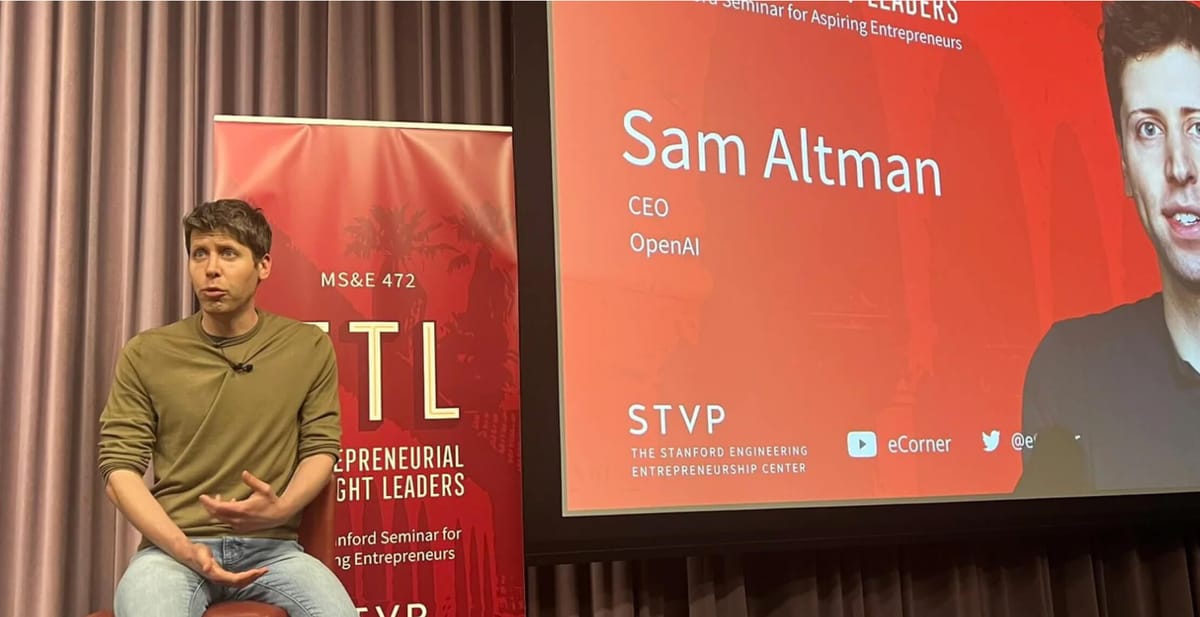
In a recent conversation with Ravi Belani at Stanford University's Entrepreneurial Thought Leaders (ETL) series, Sam Altman, CEO and co-founder of OpenAI, shared his insights on the rapid advancements in AI, the opportunities and challenges it presents, and his advice for aspiring AI entrepreneurs. He also took the time to field a wide range of questions from students. It's a great conversation that I highly encourage everyone to watch in its entirety.
In this article, I highlight my top takeaways and summarize his most important points:
Altman emphasized the extraordinary pace of AI development, stating, "We can say right now with a high degree of scientific certainty, GPT 5 is gonna be smarter than, a lot smarter than GPT 4, GPT 6 can be a lot smarter than GPT 5 and we are not near the top of this curve." He stressed that AI is not just going to improve in specific areas or modalities, but rather, it will become smarter in a general sense. The gravity of this statement, Altman believes, is still underrated.
In a remarkably candid moment, Altman admitted, "ChatGPT is like mildly embarrassing at best. GPT4 is the dumbest model any of you will ever, ever have to use again by a lot." However, he emphasized the importance of iterative deployment and tight feedback loops in the development of AI systems. "It's important to ship early and often and we believe in iterative deployment," he said.
Altman warned against building AGI in isolation, without involving society. "If we go build AGI in a basement and then, you know, the world is like kind of blissfully walking blindfolded along. I don't think that makes us like very good neighbors," he explained. Instead, he believes that putting AI products in people's hands and allowing society to co-evolve with the technology is crucial. "People don't wanna be surprised, people want a gradual rollout and the ability to influence these systems." He further stressed "Let society tell us what it collectively and people individually want from the technology. How to productize this in a way that's gonna be useful. Where the model works really well, where it doesn't work really well. Give our leaders and institutions time to react, give people time to figure out how to integrate this into their lives..."
When asked about the significant expenses involved in AI development, Altman had a surprising response. "Whether we burn $500 million a year or $5 billion or $50 billion a year, I don't care. I genuinely don't. As long as we can stay on a trajectory where we eventually create way more value for society than that, and as long as we can figure out a way to pay the bills, we're making AGI. It's gonna be expensive, but it's totally worth it," he stated.
While AI has the potential to revolutionize society, Altman offered a nuanced perspective on its impact. He predicted that AGI would significantly enhance human capabilities, but the world may not seem drastically different day-to-day. "In some sense, it will be super different, and in some sense, not different at all," he said, emphasizing that while AGI will enable us to accomplish more complex tasks, it won't change the fundamental nature of human experiences and interactions.
Altman also addressed the potential dangers of AI—both subtle and cataclysmic. While much attention is given to existential risks, he expressed more concern about the pernicious effects that may go unnoticed, drawing a parallel to the widespread attention deficit issues arguably caused by social media platforms like TikTok.
For those eager to dive into the world of AI entrepreneurship, Altman's advice is clear: trust your intuition, be prepared to adapt, and focus on being right rather than just contrarian. He encouraged aspiring entrepreneurs to chart their own course and pursue ideas that may not be obvious to others.
"I think this is probably the best time to start a company since the internet at least. And maybe kind of like in the history of technology. I think what you can do with AI is gonna just get more remarkable every year."

